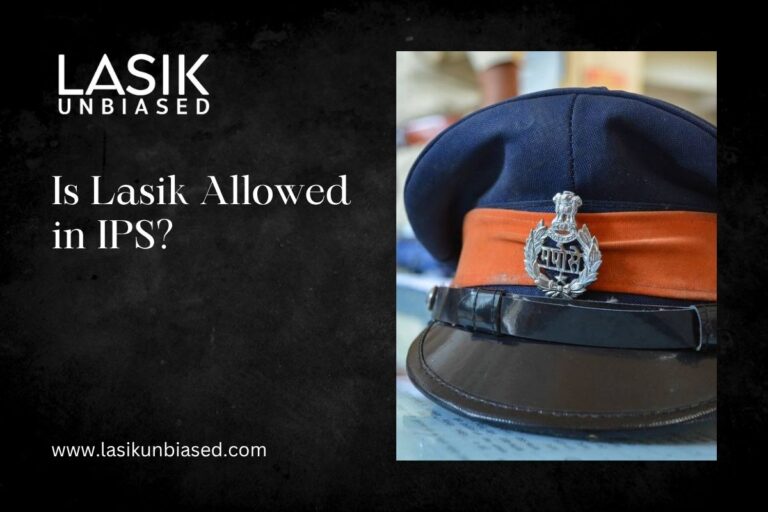Yes, LASIK surgery is allowed for IPS (Indian Police Service) aspirants.
Candidates who have undergone LASIK or similar corrective procedures can be considered for IPS, provided they meet all vision and eye health standards set by the medical board.
If you’re considering a career in the IPS and have had (or are planning) LASIK, this blog will help you understand the rules, requirements, and what to expect during the selection process.
Understanding LASIK and Its Relevance for IPS Aspirants
LASIK (Laser-Assisted In Situ Keratomileusis) is a popular vision correction surgery that helps people with myopia, hyperopia, or astigmatism achieve clear vision without glasses or contact lenses. For many government jobs, especially in the uniformed services, eyesight standards are strict. Naturally, aspiring IPS officers often wonder if LASIK will affect their eligibility.
The good news: IPS does not disqualify candidates who have had LASIK, provided they meet the required vision standards and have no underlying eye health issues.
IPS Vision Standards: What Does the Medical Board Look For?
Distant and Near Vision Requirements for IPS
The IPS has clearly defined vision standards for both male and female candidates:
- For Males: Distant vision should be 6/6 or 6/9 in the better eye.
- For Females:
- Distant Vision should be 6/12 or 6/9 in the worse eye.
- Near Vision should be J1 for the good eye, J2 for the worse eye.
If you meet these standards after LASIK, you are eligible to apply.
Refractive Error Limits and Special Considerations
Unlike some other government roles, the IPS does not set a strict upper limit for refractive error (the degree of myopia or hyperopia). However, there are important conditions:
- No cap on refractive error: Candidates with myopia greater than 6.00 D (including spherical and cylindrical error) are referred to a special Myopia Board.
- Myopia Board Evaluation: This board examines the retina for degenerative changes using both direct and indirect ophthalmoscopy.
- If the macular area is healthy, the candidate is considered fit.
- If there are treatable peripheral degenerative changes, the candidate is temporarily unfit until treatment is completed.
- Untreatable macular degenerative changes result in being declared unfit.
- Candidates with myopia up to 6.00 D and a healthy retina are considered fit.
Colour Vision, Binocular Vision, and Other Eye Health Criteria
- Colour Vision: High-grade colour vision is required; candidates must pass the Ishihara Test. Any colour blindness is a disqualification.
- Binocular Vision: Good binocular vision is mandatory. Squint or any condition affecting binocular vision can lead to disqualification.
- Other Eye Health: No night blindness, progressive or organic eye diseases, or other serious eye conditions are allowed.
Is LASIK Acceptable for IPS? The Official Stance
Permissible Corrections and Surgery
The IPS medical standards explicitly allow candidates to use spectacles, lenses, or undergo corrective eye surgeries such as LASIK, ICL (Implantable Collamer Lens), or IOL (Intraocular Lens). However, there are some important rules:
- Declaration Required: Candidates must declare any prior eye surgery during the medical examination.
- Special Ophthalmological Board: All candidates with a history of LASIK or similar procedures are referred to a special board for evaluation.
- Board’s Role: The board checks for:
- Stable, healthy vision post-surgery
- Absence of complications or progressive eye disease
- Compliance with all IPS vision standards
What Happens During the IPS Medical Board Evaluation?
After the UPSC interview, candidates undergo a comprehensive medical examination. If you’ve had LASIK, here’s what to expect:
- Detailed Eye Examination: The board will assess your visual acuity, colour vision, binocular vision, and overall eye health.
- Retinal Check: Especially for those with high myopia, the retina is checked for degenerative changes.
- Surgical Records: You may be asked to provide documentation of your LASIK procedure and post-operative reports.
- Outcome: If you meet all criteria and have no complications, you will be declared medically fit for IPS.
IPS LASIK Eligibility Checklist
If you’re planning to apply for IPS and have had (or are considering) LASIK, use this checklist:
- Meet the vision standards: 6/6 or 6/9 (good eye), 6/12 or 6/9 (worst eye), J1/J2 near vision.
- No colour blindness: Pass the Ishihara Test.
- Good binocular vision: No squint or related issues.
- No night blindness or progressive eye disease.
- Declare your LASIK or other corrective procedure during the medical exam.
- Bring all relevant medical documents to the medical board.
- Allow enough time after surgery for full healing and vision stabilisation.
LASIK and IPS: What the Data and Experts Say?
Medical boards and ophthalmologists involved in IPS selection emphasise that the focus is on functional vision and eye health, not the method of correction. LASIK, when successful and free of complications, is seen as equivalent to wearing glasses or contact lenses for eligibility purposes.
Candidates with a history of LASIK who meet the vision and health standards are routinely selected for IPS. The key is transparency during the medical process and ensuring your eyes are healthy at the time of evaluation.
LASIK for IPS: Pros and Cons
Pros
- Freedom from glasses or contact lenses during training and service
- No disadvantage in the selection process if you meet all standards
- Accepted by the medical board if all criteria are fulfilled
Cons
- Potential for rare complications (e.g., dry eyes, glare)
- Need for documentation and a clear medical history
- Surgical risks, though minimal with modern techniques
Tips for IPS Aspirants Considering LASIK
- Consult a qualified ophthalmologist before surgery and discuss your IPS ambitions.
- Schedule LASIK well in advance of the UPSC medical examination.
- Follow all post-surgery care instructions to ensure optimal healing.
- Maintain a file of all medical records related to your eye health and surgery.
- Be transparent about your surgical history during the selection process.
Final Thoughts: LASIK and Your IPS Dream
LASIK is allowed for IPS aspirants, and many successful officers have undergone the procedure. The IPS medical board prioritises your current vision and eye health, not whether you wear glasses, contacts, or have had corrective surgery. By meeting the required standards and being proactive about your eye health, you can confidently pursue your goal of joining the IPS, even after LASIK.
If you’re planning LASIK with an eye on the IPS, consult both your ophthalmologist and review the latest UPSC notifications. Stay informed, stay prepared, and keep your focus clear—both literally and figuratively.
Ready to take the next step? Research the best LASIK surgeons, plan your timeline, and keep your IPS dream in sight. If you have questions about medical standards or the selection process, reach out to recent IPS officers or medical professionals familiar with UPSC requirements.
Common Questions About LASIK and IPS Eligibility
Will LASIK Disqualify Me from IPS?
No, LASIK does not automatically disqualify you from IPS. As long as you meet the vision standards and have no underlying eye health issues, you are eligible.
Are There Any Risks to Having LASIK Before IPS Selection?
While LASIK is generally safe, there are a few things to keep in mind:
- Healing Time: It’s wise to have LASIK well before your medical exam to allow for complete healing and vision stabilisation.
- Potential Complications: Rare complications (such as corneal haze or night vision issues) could affect your eligibility if they impact your vision or eye health.
How Does IPS Compare with Other Government Services for LASIK Eligibility?
Some government jobs, especially in the armed forces, have stricter rules regarding LASIK and may not allow it for certain posts. The IPS is more flexible, focusing on current vision and eye health rather than the method used to achieve it.
What If I Have High Myopia or Other Complex Eye Issues?
If your myopia exceeds 6.00 D, you will undergo additional evaluation. The key factor is retinal health—if your retina, particularly the macular area, is healthy, you can still be declared fit.


